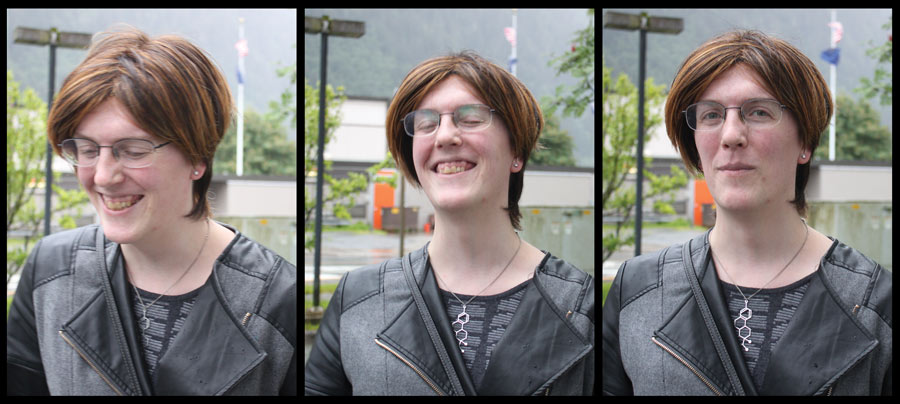
It’s been a year since Juneau resident Jennifer Fletcher started to publicly present herself as a woman, less than two years since she first started to shed her male identity and rebuild herself as female. But the inner journey to get to that point began long before then.
Jennifer Fletcher used to spend up to five hours a day escaping reality. She’d play games on the computer, visit websites for the transgender community, “Pretty much anything I could do to not focus on the present, not focus on how things actually were so I could actually at least attempt to function throughout the rest of the day,” she says.
She’d go through binge and purge cycles of cross dressing. She regularly thought about suicide. Fletcher was severely depressed.
“I was continuously hiding who I was and trying to quite literally leave no mark on the world,” she says.
Fletcher is 33 and moved to Juneau as a teenager.
On any given Friday night now, you can almost always find her at social night run by SEAGLA, the Southeast Alaska lesbian, gay, bisexual and transgender organization in Juneau.
But it took her a long time to realize she was transgender, even though signs throughout her life pointed to it.
“Let’s just say that I had consistently wished from the time I was about 12 on every star, on every birthday that I’d wake up as the female version of myself,” Fletcher says.
As an adolescent, she’d wear her mother’s clothes when she was home by herself, taking items from the laundry so no one would notice.
Fletcher was 14 when she first tried to castrate herself. She tried again when she was 15.
“I was actively envying all the girls who were going through their own puberties, their own processes and just not very happy with what was going on. While I have occasionally, temporarily, appreciated having things like facial hair or greater strength or things of that sort, they just aren’t me,” Fletcher says.
But in her teens, she refused to consider she was transgender. Fletcher went to high school in Juneau, but was born in Laramie, Wyoming, where gay college student Matthew Shepherd was murdered in 1998. She learned being different wasn’t safe.
She saw transgender individuals on talk shows where they were mocked and laughed at.
“At that point in time, society was teaching individuals like myself that no, it’s not OK to be. That if you wanted to actually have any chance of happiness that you had better suppress what’s going on and you had better hope that you aren’t really,” Fletcher says.
She says finally deciding to transition almost two years ago didn’t stem from courage, but from an utter sense of fear.
“I was faced with what I thought were basically two alternatives – death or transition. Whether it would’ve been death by suicide or by the slow gradual path of alcoholism or whatever other coping mechanisms I attempted to use that would’ve inevitably failed,” Fletcher says.
She chose transition. Fletcher dropped what she calls the male mask and started rebuilding herself. She came out to close family and friends and started dressing as a woman at social functions. Fletcher eventually started the medical process and taking hormones. At each step, she was so afraid of rejection.
“Almost all of the hurdles I’ve experienced in my transition have been self-imposed. They’ve all been fears that may have had a legitimate base, but had invariably been blown completely out of proportion into these vast monsters that seemed like I’d be incapable of standing against,” Fletcher says.
When I ask Fletcher what her prior first name was, she doesn’t tell me, “Not particularly relevant, I don’t think.”
She says there tends to be an overemphasis on who people once were or appeared to be.
“I had been looking at some old photos of myself and actually opted to post some of them on Facebook just to kind of show how very different a person I am now. One of my friends actually said outright that they felt they were looking at a dead person, which I think actually sums up how I was feeling in those photos as well,” Fletcher says.
She does a lot of things she used to do before she transitioned, like rock climb, play board games, read. But she says her priorities have shifted.
“Before I actually started this process, I was merely existing in the world and, to be honest, waiting to die. Now I am actually alive and the difference is quite amazing,” Fletcher says.
And she wants to make a difference. Fletcher helps run a transgender support group in Juneau called the Trans* Alaska Pipeline. She wants to make finding medical and professional resources easier. She wants to help others avoid some of the internal conflict she had and help them face their fears, one monster at a time.